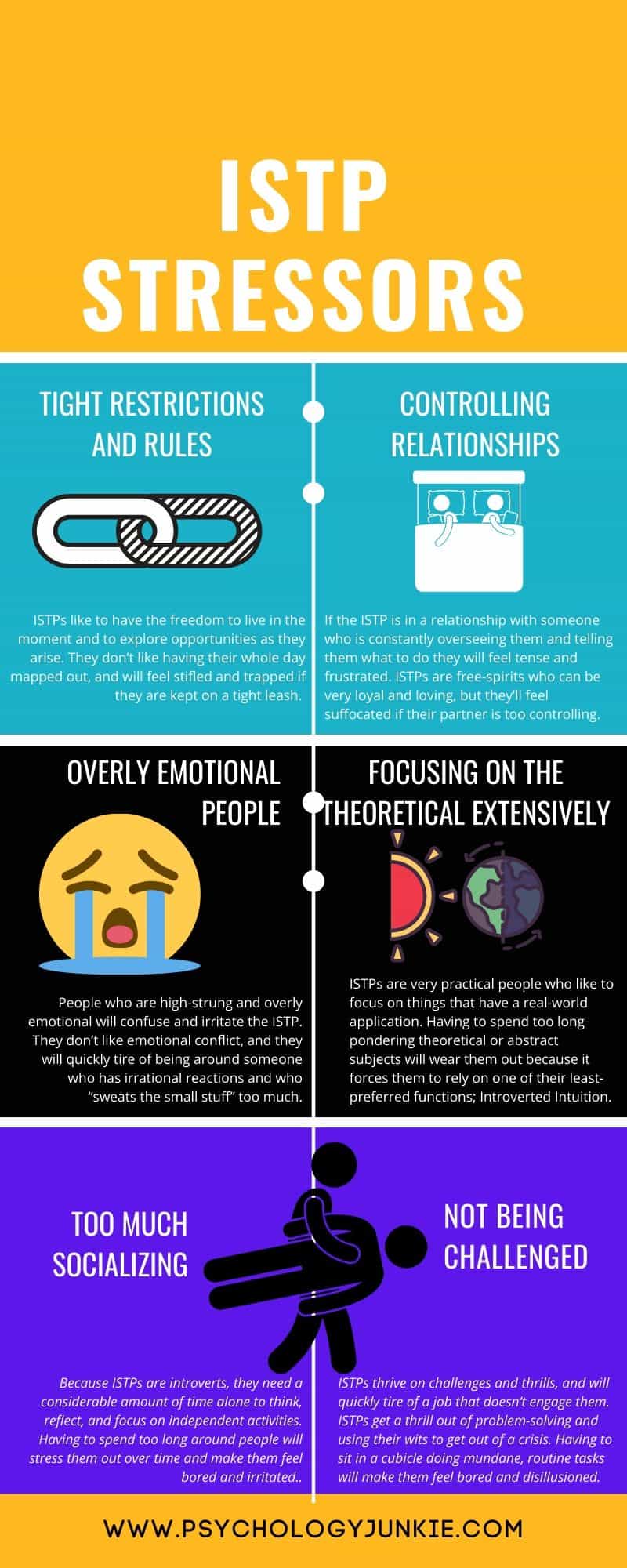What ISTPs Do When They’re Really Stressed Out
“Both in fighting and in everyday life you should be determined though calm. Meet the situation without tenseness yet not recklessly, your spirit settled yet unbiased. Even when your spirit is calm do not let your body relax, and when your body is relaxed do not let your spirit slacken. Do not let your spirit be influenced by your body, or your body be influenced by your spirit.”
– Miyamoto Musashi, ISTP
Quietly intense and pragmatic, the ISTP is one of the most enigmatic of the Myers-Briggs® personality types. Often represented in film as the lone-wolf vigilante, the ISTP tends to have a cool, devil-may-care demeanor. Their superpower lies in their dominant Introverted Thinking (Ti). This function helps them to form intricate, logical conclusions and to stay objective in their decisions. ISTPs also use their auxiliary Extraverted Sensing (Se) to act quickly and with an awareness of their physical environment. They are rarely startled because they are so tuned in to the world around them.

You’ll see many ISTPs throughout history and in the arts; people like Samurai author Miyamoto Musashi, Congressman Ron Paul, actor Clint Eastwood, and actress Scarlett Johansson.
But what stresses out these calm, action-oriented types? Let’s take a look!
7 Things That Stress Out ISTPs
1 – Tight Restrictions and a Rigid Structure
ISTPs like to have the freedom to live in the moment and to explore opportunities as they arise. They don’t like having their whole day mapped out, and will feel stifled and trapped if they are kept on a tight leash. Micro-managing, rigidity, and a full schedule all irritate and stress the normally laid-back ISTP.
2 – Controlling Relationships
This point goes hand-in-hand with the first. If the ISTP is in a relationship with someone who is constantly overseeing them and telling them what to do they will feel tense and frustrated. ISTPs are free-spirits who can be very loyal and loving, but they’ll feel suffocated if their partner is too controlling.
3 – Dealing with Irrational or Overly Emotional People
ISTPs have a strong sense of logic and they try to step outside of situations to see them as objectively as possible. People who are high-strung and overly emotional will confuse and irritate the ISTP. They don’t like emotional conflict, and they will quickly tire of being around someone who has irrational reactions and who “sweats the small stuff” too much.
4 – Focusing on Theoretical Concepts for Too Long
ISTPs are very practical people who like to focus on things that have a real-world application. Having to spend too long pondering theoretical or abstract subjects will wear them out because it forces them to rely on one of their least-preferred functions; Introverted Intuition. While ISTPs can enjoy the occasional theoretical conversation or study, they would much prefer learning and talking about things that they can use in their everyday life.
5 – Too Much Socializing
Because ISTPs are introverts, they need a considerable amount of time alone to think, reflect, and focus on independent activities. Having to spend too long around people will stress them out over time and make them feel bored and irritated.
6 – Being in a Non-Challenging Work Environment
ISTPs thrive on challenges and thrills, and will quickly tire of a job that doesn’t engage them. ISTPs get a thrill out of problem-solving and using their wits to get out of a crisis. Having to sit in a cubicle doing mundane, routine tasks will make them feel bored and disillusioned.
7 – Having their Personal Values Disrespected
It takes a lot to rile up an easy-going ISTP, but they do have a strong set of personal values and desires. When people are disrespectful of their needs and values the ISTP may just want to shut them out entirely. ISTPS don’t like drama and would rather be alone than deal with people who don’t respect their needs.
How the ISTP Responds to Stress:
In order to address how the ISTP responds to stress, we need to acknowledge the different types of stress they experience. There’s normal, everyday stress, and then “grip” stress. Both elicit completely different responses.
Everyday Stress
When experiencing everyday stress, the ISTP will seem more extreme in their preferences, or true-to-type. They may pull away from people and try to sort through the problem logically in their mind, using Introverted Thinking, until they can find a solution. ISTPs are generally very good at compartmentalizing and they may try to push stressors into the background and ignore them. If stressors increase, they may respond by lashing out at whoever is causing them stress. They may feel a need to “get even” or prove a point. They may become obsessed with logic and lose track of organization and projects they need to fulfill. If stress continues to build, they run the risk of over-using their dominant function, Introverted Thinking. When this happens, they may fall into the grip of their inferior function; Extraverted Feeling.
“Grip” Stress
Grip stress usually occurs when the ISTP is dealing with severe stress, chronic stress, or illness. Grip stress can happen when the ISTP has overused their two favorite functions, Thinking and Sensing, and has worn them out. It can also occur when their inferior function, Extraverted Feeling, is “triggered” by having to focus for too long on the emotions and moods of others.
When an ISTP is experiencing grip-related stress, they may seem completely unlike their usual self. When their inferior function takes over, the ISTP will seem more like an unhealthy ENFJ, which is confusing to them and those around them. They may become unusually emotive and insecure about their relationships. They may misinterpret small, insignificant details into the belief that the people hate or dislike them. They might struggle with bitterness and resentment. They may seek affirmation and acceptance from people in an effort to calm their fears. They may be fidgety, excessively sarcastic, and accusatory.
How ISTPs Can Get Relief From Stress:
Get Some Alone Time!
ISTPs need to be able to get away from everyone when they’re stressed out and try to deal with their emotions and problems alone. They are very independent people who like to have space when things are bothering them. Being in a solitary environment can help them to think more clearly about the problems at hand, and can help to keep the stress from escalating.
Cancel Any Non-Essential Responsibilities
ISTPs thrive on unstructured, unplanned time and will instantly feel less stressed if they can cross some items off their to-do list. Being able to minimize their responsibilities and get away from the world for a little bit can help them to find balance and see things more clearly again.
On a side note, if the ISTP is under such frequent stress that they are regularly retreating from their loved ones and tasks, they may need some counseling or a change in lifestyle to help minimize the stress in their lives so that they can live more fully.
Exercise
When ISTPs are stressed they may feel like they are overloaded with pent-up energy and adrenaline. Exercise allows them to get out some of that energy in a healthy way, and it also helps them to access their auxiliary Extraverted Sensing. This is important, because using Sensing pulls them out of their inferior function if they’re experiencing grip stress, and can help to normalize their perspective. Using Sensing can also help the ISTP to not wear out their dominant function; Introverted Thinking.
Engage in Light Problem Solving
ISTPs that are stressed may be so overwhelmed by trying to solve a major problem or so overwhelmed by their feelings rising up that they can’t seem to find balance. Engaging in a non-related activity that uses their thinking in a less-pressured way can help them to regain equilibrium. Some ISTPs enjoy reading mystery novels, playing Sudoku, or finding a computer game to enjoy. Doing activities like these can help them to regain control over their dominant function and get out of a grip experience.
Play a Video Game
Some ISTPs find that getting away and playing a video game helps them to take out their frustrations and let go of some of their pent-up energy. First-person shooters seem to especially be a favorite among ISTPs.
Sex
ISTPs are very sensory and action-oriented individuals, but if they are experiencing a grip stress reaction they may feel overwhelmed with emotions they can’t control. Being able to connect intimately with their spouse can help pull them out of their inferior feeling function, and direct them towards their auxiliary sensing function. This is one way for them to escape a grip stress reaction. Obviously this applies to a responsible sexual relationship, and not an impulsive, reckless sexual relationship that could cause more harm than good.
Eat Nutritious Food
Another healthy way for ISTPs to find balance is to eat nutritious foods that can naturally decrease stress. Green leafy vegetables, yogurt, salmon, pistachios, and blueberries are all foods that are rumored to relieve stress and keep the body healthier. Eating can engage the ISTPs auxiliary Sensing function and pull them out of overusing their dominant Thinking function or overusing their inferior Feeling function.
Talk to a Good Friend Who Will Listen Without Judgment
Initially, during stress, ISTPs will just want to be alone as much as possible. However, as stress subsides, they may feel better talking about it with someone they trust who can remain calm and rational. They absolutely do not want to be asked how they feel or have to answer a lot of questions. The friend can help by affirming that their response is okay and just listening and forgiving out-of-character behavior.
In Conclusion:
ISTPs are some of the most quick-thinking, quick-witted individuals you will ever meet. They are compelled to understand how things work, how to fix things, and how to apply practical solutions to complex problems. They are known for their adventurous spirit, their fairness, and their concise, direct approach to life. ISTPs have low stress compared to most other types, however, they are the type second most likely to report heart disease or hypertension. They have a habit of holding stress in their bodies and so managing stress and finding healthy outlets is imperative.
“Be yourself. Follow your instincts. Success depends, at least in part, on the ability to ‘carry it off’.”
– Donald Rumsfeld, an ISTP
What Are Your Thoughts?
Did you enjoy this article? Do you have any thoughts or insights to add? Let us know in the comments!
Find out more about your personality type in our eBooks, Discovering You: Unlocking the Power of Personality Type, The INFJ – Understanding the Mystic, and The INFP – Understanding the Dreamer. You can also connect with me via Facebook, Instagram, or Twitter!
















Wow… This explained a lot about my husband and his recent reactions with me, especially during the pandemic. It doesn’t help that I am INFJ and experiencing grip stress too. We are literally on opposing sides right now while trying to navigate our individual responses to the pandemic. Thank you for the great article, it has shown me how I am irritating him without even realizing it.
This explains a lot. When I’m out of it, I always wonder why the heck I’m so unusually emotional about everything. One time when I spent the whole day in my house, I couldn’t just sit on the couch with my family and watch tv. At first, I was fine, but later in the day I became restless because we were doing NOTHING. Agh, I had to go to my room because staying in the living room meant harsh/sarcastic/accusing responses to my parents, and some crying. …🎉…